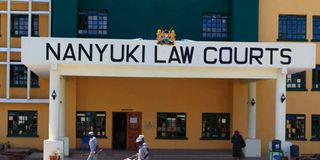British Army to appeal Lolldaiga ruling

Nanyuki Law Courts. The British Army is set to appeal a decision by this court that declined its claim of state immunity and found it subject to Kenyan laws.
The British Army is set to appeal a High Court decision that declined its claim of state immunity finding it subject to Kenyan laws.
In a notice of appeal filed last week before the Environment and Land Court in Nanyuki, the military, through its lawyer, Mr Lawson Ondieki, says it is dissatisfied with the ruling of Justice Antonina Kossy Bor issued on March 10.
In the decision, which was anchored on the Defence Co-operation Agreement (DCA) implemented by the United Kingdom (UK) and Kenyan governments in 2016, the judge found that the army was not immune to prosecution.
She ruled that Kenyan courts have the jurisdiction to hear and determine criminal and civil matters involving British soldiers on the basis that the UK Government waived its state immunity by signing the DCA.
In the notice, Mr Ondieki has told the Lands court that the UK military intends to move to the Court of Appeal to challenge the decision.
“We will be grateful if you could provide us with a copy of the typed proceedings in this matter for purposes of appeal,” he says.
In the suit, the British Army Training Unit in Kenya (Batuk) together with the Lolldaiga Hills Ltd have been embroiled in a dispute with 1,496 residents of the Lolldaiga community in Nanyuki and the African Corrective and Preventive Action, an environmental NGO.
The community and the NGO (petitioners) accuse the UK military of starting a fire during training at the Lolldaiga Conservancy on March 25, last year.
In the matter, the petitioners say that the fire ravaged more than 10,000 acres of land, causing damage to plants, animals and affecting the communities living near the ranch.
As a result, wildlife at the 49,000-acre conservancy escaped into people’s farms destroying produce.
The inferno also emitted smoke that contained dangerous chemicals, causing adverse health effects in both people and livestock.
But all through the court proceedings, Batuk claimed sovereign immunity, saying that the fire arose from a military exercise sanctioned by the governments of the UK and Kenya, and it could not submit to the jurisdiction of a Kenyan court.
In her ruling on the suit, Justice Bor referred the matter to the Inter-Governmental Liaison Committee, which as per the DCA, is tasked with solving civil disputes between the community and the UK army.
She faulted the community and NGO for failing to exhaust the dispute resolution mechanisms provided for under the DCA before moving to court, but found that even so, Kenyan courts had jurisdiction to hear and determine such cases.
She ruled that if the committee failed to resolve the dispute, the petitioners had the discretion to move back to court for the suit to resume.
The Appeal Notice comes at a time when the petitioners, through their lawyers Kelvin Kubai and Maxwell Gichuhi, have moved to the British High Commission and the Attorney General requesting them to enforce the court’s orders.
A letter seen by the Nation dated March 30, and addressed to the two offices, shows that the court referred the matter to the Inter-Governmental Liaison Committee for resolution through the ministries of Defence of Kenya and the UK.
The letter seeks to find out whether the committee is in existence, who its members are and when it is expected to sit.
Mr Kubai and Mr Gichuhi have also requested to know if the committee has held any meetings before.
In the letter, they have asked whether the community and the NGO shall be accorded an opportunity to nominate at least two civilians to serve on the committee for purposes of ensuring a transparent, accountable and fair hearing.
“Does the committee have its own Rules of Procedure or shall the Civil Procedure Rules of Kenya apply?” ask the lawyers in the letter.





